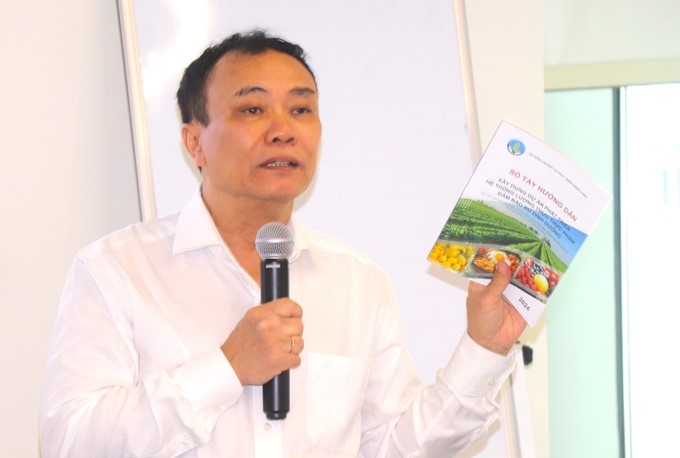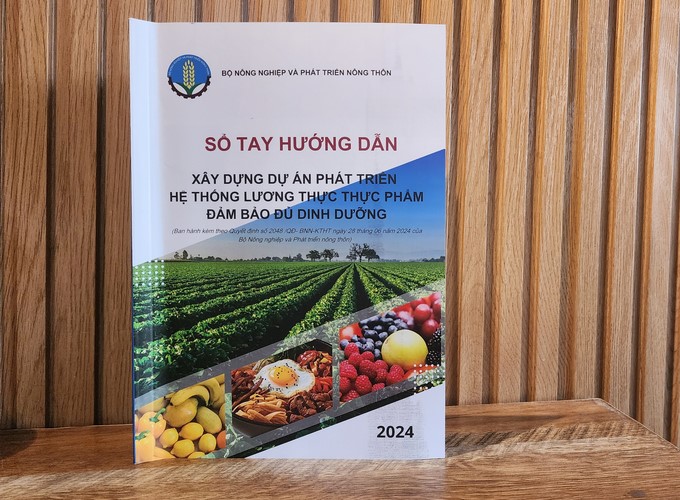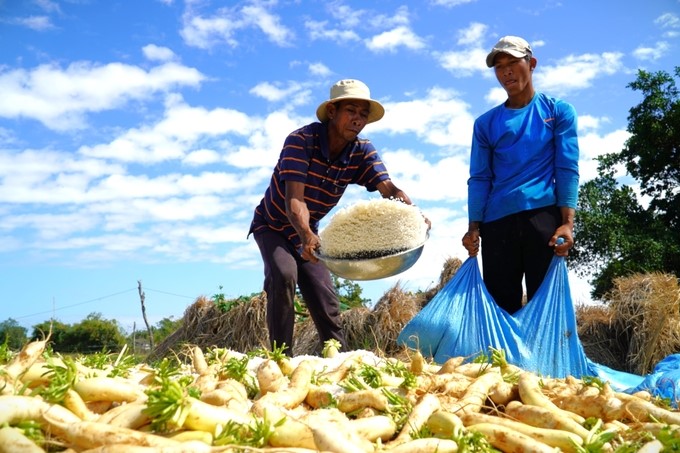June 19, 2025 | 18:52 GMT +7
June 19, 2025 | 18:52 GMT +7
Hotline: 0913.378.918
June 19, 2025 | 18:52 GMT +7
Hotline: 0913.378.918

Mr. Le Duc Thinh, Director of the Department of Cooperatives and Rural Development, introduced the Handbook for Buiding the Project on Developing Food Systems Ensuring Adequate Nutrition. Photo: Kim Anh.
On September 27, the Department of Cooperatives and Rural Development (Ministry of Agriculture and Rural Development) coordinated with the Alliance of Bioversity International and the International Center for Tropical Agriculture (CIAT) to experimentally deploy the Handbook for Building the Project on Developing Food Systems Ensuring Adequate Nutrition (referred to as the handbook).
This activity is within the framework of the national action program "Zero Hunger" by 2025 and the initiative "Securing the Food Systems of Asian Mega-Deltas (AMD) for Climate and Livelihood Resilience" in the 2022–2024 period.
The handbook is a guidance document for sector officials on agriculture, health, and labor and for organizations on building, organizing, implementing, monitoring, and evaluating the Project on Developing Food Systems Ensuring Adequate Nutrition for stakeholders.
The handbook includes four parts: Introduction to the Project on Developing Food Systems Ensuring Adequate Nutrition; project construction; monitoring and evaluating project implementation results; implementation guiding appendices.

The handbook was compiled for provinces and cities to refer to and guide officials and people participating in the construction and implementation of the Project on Developing Food Systems Ensuring Adequate Nutrition. Photo: Kim Anh.
On June 12, 2018, the Prime Minister issued the National Action Program "Zero Hunger" in Vietnam with the goal of ensuring food and nutrition for people. Thereby, improving the physical status, intelligence, and stature of Vietnamese people, and implementing the sustainable development goal committed by the Vietnamese Government to the United Nations.
During the 2018–2023 period, the program has contributed to the development and replication of agricultural models that ensure nutrition in rural areas.
Mr. Le Duc Thinh, Director of the Department of Cooperatives and Rural Development, said that following the program "Zero Hunger," the Prime Minister issued Decision No. 300/QD-TTg dated March 28, 2023, approving the National Action Plan on Food System Transformation towards Transparency, Responsibility, and Sustainability until 2030.
Currently, Vietnam is one of the countries that has achieved outstanding achievements in implementing the goals of hunger eradication, poverty reduction, and food security in recent years.
In 2022, Vietnam's global food security index reached 67.9 points, ranking 46/113 countries. Among them, the reasonable food price index is rated highest with 84 points due to providing enough supply at relatively stable prices.
However, malnutrition among people, especially children in disadvantaged areas, is still high compared to the World Health Organization's assessment, creating large differences between regions across the country.

Food system transformation contributes to improving people's income and quality of life and responding to climate change. Photo: Kim Anh.
Besides, Vietnam also faces challenges of climate change and natural disasters; land and water resources being reduced in quality and quantity; emerging diseases in animals, plants, and humans; changes in consumer demand, market standards, etc.
Meanwhile, today's food security goal is not only to ensure enough rice and food crops but also to ensure people's nutritional needs and livelihoods.
This requires an integrated, interdisciplinary approach to solve food security and nutrition issues associated with the goals of sustainable poverty reduction and new rural construction.
Specifically, transforming the food system from production, processing, and distribution to consumption towards transparency, responsibility, and sustainability and ensuring national food security and nutrition.
Promoting the increase in people's income and quality of life, preventing natural disasters and epidemics, protecting the environment, and responding to climate change.
The project on develoing food systems ensuring adequate nutrition has deployed training and support for staff to go to households to advise and transfer techniques and knowledge of agricultural production ensuring nutrition and safety.
Support production materials, tools, and equipment in pre-processing, processing, and preservation of food to improve the value of agricultural products, food safety, and ensure nutrition.
Translated by Thu Huyen
![Turning wind and rain into action: [9] Digitizing hydrometeorological data in response to climate change](https://t.ex-cdn.com/nongnghiepmoitruong.vn/608w/files/news/2025/06/17/z6704423696987_15fd32ffc26d590d204d520c9dac6786-nongnghiep-165943.jpg)
(VAN) Farmers have begun accessing hydrometeorological applications to adjust their cropping schedules, aiming to ensure productivity and adapt to climate change.
![Turning wind and rain into action: [8] Real-time salinity detection and early warning technology](https://t.ex-cdn.com/nongnghiepmoitruong.vn/608w/files/news/2025/06/17/z6704423696987_15fd32ffc26d590d204d520c9dac6786-nongnghiep-151127.jpg)
(VAN) Thanks to the integration of modern hydrological-hydraulic models, remote sensing technologies, and artificial intelligence, the accuracy of hydrological forecasting has significantly improved.
![Turning wind and rain into action: [7] Early disaster warnings help marine farmers minimize losses](https://t.ex-cdn.com/nongnghiepmoitruong.vn/608w/files/news/2025/06/17/z6704423696987_15fd32ffc26d590d204d520c9dac6786-nongnghiep-142942.jpg)
(VAN) In recent years, thanks to early disaster warnings and forecasting, marine farmers in Khanh Hoa province have been able to reduce risks and losses, thereby improving production efficiency.
![Turning wind and rain into action: [6] ‘Four on-the-spot’ disaster management software](https://t.ex-cdn.com/nongnghiepmoitruong.vn/608w/files/news/2025/06/17/e5a48259d6a262fc3bb3-nongnghiep-183800.jpg)
(VAN) By simply activating the scenario on the disaster management software, the relevant authorities immediately know how many households need to be evacuated, where to evacuate them to, and by what means of transportation…
![Turning wind and rain into action: [5] Hue applies modern technology in disaster forecasting](https://t.ex-cdn.com/nongnghiepmoitruong.vn/608w/files/news/2025/06/17/z6704423696987_15fd32ffc26d590d204d520c9dac6786-nongnghiep-093938.jpg)
(VAN) In Hue city, modern technology has recently been applied in meteorological and hydrological forecasting and warning, helping to reduce the damage caused by natural disasters.

(VAN) A cutting-edge farming technique being implemented on an experimental ranch in Arizona's Sonoran Desert has already saved a billion gallons of water over five years, according to Civil Eats.

(VAN) Poultry and pig production and the environment can be boosted through enhanced water technology, according to new research.